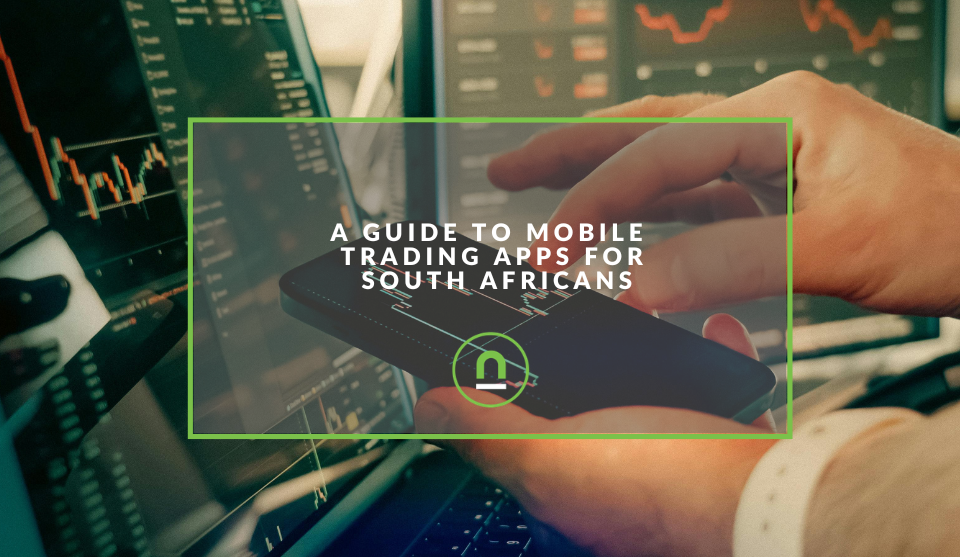Recent posts

Athletes
Peptide Use for Muay Thai Training
23 February 2026

Money Talks
A Guide To Mobile Trading Apps for South Africans
19 February 2026

Press Releases
Rehab Your Knee: A Free, Evidence-Based Guide to Smarter Recovery
12 February 2026

Money Talks
XRP vs. Stablecoins: Which Is Better for Cross-Border Payments in 2026?
28 January 2026
Popular posts
Extravaganza
Trending Music Hashtags To Get Your Posts Noticed
24 August 2018
Geek Chic
How To Fix iPhone/iPad Only Charging In Certain Positions
05 July 2020
Extravaganza
Trending Wedding Hashtags To Get Your Posts Noticed
18 September 2018
Money Talks
How To Find Coupons & Vouchers Online In South Africa
28 March 2019
South Africas Most Popular WhatsApp Scams
16 November 2023 | 2 comments | Posted by Che Kohler in Alarming
In South Africa, crime and scams are a dime a dozen; while many of us think of criminals getting into our personal space as the primary threat and remains a concern for the average citizen, it's not the only way for charlatans to get to your wallet.
As technology lowers barriers to entry, it comes with a trade-off: we get to enjoy cheaper services, but on the flip side, it allows criminals to reach for more people at a low cost. WhatsApp is a prime example; the fact it is a 1 to 1 communication tool that eliminates the cost tied to SMS makes it the ideal platform to broadcast your scams.
WhatsApp has become an integral part of daily communication for many South Africans, with around 23 Million South Africans using the service monthly. Its widespread use lends credibility to the service, and scammers have also found fertile ground to prey on unsuspecting users.
South African scammers wasted no time coming up with creative ways to lull victims out of cash and more. As the word spreads that these ploys work, opportunists will jump on board to try and profit from these trends.
If you're an unemployed South African, of which a large portion of the country is, you have all the time in the world to work on perfecting your scam pitch and trying it out for the cost of a cheap Smartphone and a data bundle.
So what are these scams, and how do they work?
1. Fake job offers
The job market in South Africa is less than stellar, and scammers know this, which is why fake jobs are a popular scam vehicle.
Scammers often pose as recruiters or employers, going as far as to copy branding from reputable companies or stealing the profiles of real recruiters. These scammers will then approach targets, offering enticing job opportunities with high salaries.
They may ask for upfront fees or personal information, such as bank details or ID numbers, under the guise of application processing or background checks. Never provide sensitive information or make payments for job applications through WhatsApp.
Also, if you're paying for a job before you're bum is in the seat, and you have a signed contract, you're likely being taken for a ride.
2. Voice note scams
These scams involve receiving voice notes from unknown numbers, often claiming to be from banks or government agencies. These voice notes usually contain a program you can claim funds from if you only pay a certain application fee.
In other cases, the voice notes may contain urgent messages about account issues or require you to verify personal information, which they then use to try and access your accounts.
Be cautious of unsolicited voice notes, and never disclose sensitive information over the phone.
3. Family scams
Scammers may impersonate family members, often targeting parents with messages from children claiming to be in trouble and urgently needing money.
They may exploit emotional ties and pressure victims into making quick financial decisions. Always verify the sender's identity and avoid making payments based on such messages.
If your friend or family member sends over a strange bank account number or asks for an eWallet transfer to an unknown number or a Bitcoin payment, consider parking the bus. Let them know you only have cash and you're willing to part with it if they can physically pick it up at your home and see how they respond.
Scammers can only make use of social engineering if you let them, so try calling them out and putting them in uncomfortable positions and watch their story change. Scammers don't want to be pushed off script; the moment they do, they start to make mistakes.
4. Religion and Sangoma scams
Scammers may exploit religious or traditional beliefs by posing as sangomas (traditional healers) and offering solutions to personal problems or financial difficulties.
Alternatively, they might claim to be a church representative soliciting donations for a particular project or charity.
They may request upfront payments or personal information in exchange for their services. Be wary of unsolicited messages claiming to offer supernatural solutions.
5. Phishing Scams
Phishing scams involve sending messages that appear to be from legitimate sources, such as banks or retailers. They often contain links that, when clicked, redirect users to fake websites that look genuine.
These websites may attempt to steal personal information or trick users into making payments. Never click on suspicious links or provide personal information through such websites.
6. Romance scams
Con artists create fake profiles on WhatsApp by stealing information from open Facebook or Instagram profiles as well as other dating apps to establish relationships with users and then ask for money or personal information.
This con is commonly known as pig butchering and has become far more sophisticated than you might think. In the early days, you could simply reverse lookup images to find out if this person is real or insist on meeting them before you hand over any money, but today, with AI and syndicates paying girls or guys to create content for their scams, this becomes much harder.
The rule of thumb here is if they're asking you to be the blesser and you haven't met, bless them with a goodbye.
7. Boss/team scams
Scammers are always going to be looking for smart ways of enticing individuals and taking advantage of them, and it's really important to be wary of them.
One such attack is using WhatsApp to impersonate a member of staff or one of the executives in a company.
Scammers who can access company information might contact employees and ask them to buy vouchers, pay a bill or send money while pretending to be the CEO or a manager.
The employee then does as they're told because they think they're talking to their boss and might be scared of losing their job should they not act.
8. Business account scams
Business account scams have also increased since the launch of WhatsApp for business, where anyone can create fake business accounts and impersonate real businesses to try and con people out of their money.
If you are dealing with a business on WhatsApp, consider checking in with that business via an alternative means, like their phone number or website and see if you reach the same people.
9. The Covid-19 con
The Covid grant has presented another opportunity for fraudsters. Some scam artists are using the pandemic to obtain personal information to try and get business owners who are looking for TERS grants, while individuals are targeted with promises of COVID relief grants or upgrades on their current grants.
10. Pretexting scams
Scammers spin a false narrative or use a pretext to gain the victim's trust, such as pretending to be a customer service representative or a co-worker and then asking for sensitive information.
11. Wrong number scams
Scammers may use social engineering to get personal information from a user. The scammer will pretend to be a "wrong number" and try to get personal information off the user to hack their accounts or business.
12. Baiting scams
These scams are common with the average aunty and uncle looking for a bladdy freebie online. Users are offered something of value, such as a gift, discount or prize, in exchange for personal information or actions, such as clicking on a link, downloading a file or paying a fee.
It will usually come in the form of an established brand like Woolworths offering some promotion or SA Airways giving away discount flights, something a quick visit to a brand website would dispel, but the average WhatsApp user doesn't want to waste their data to check, but they'll waste your time re-sharing this nonsense.
13. Scareware scams
This one often targets the boomer generation, who aren't as tech-savvy and only know enough about their computer or smartphone to get them into dangerous positions. Attackers will spin up some story about hardware or software issues, viruses or security breaches and create a sense of urgency or fear to manipulate the victim into taking immediate action, such as downloading fake antivirus software or paying a ransom to avoid legal consequences.
14. Investment scams
This one is probably the oldest and most popular of them all, the age-old multiplication scam or Ponzi scheme. Scammers send messages pretending to work for some platform or investment firm offering high returns on investment and ask users to transfer money to fraudulent accounts or to send over Bitcoin. These investment scams usually take the form of requesting small amounts and paying back set amounts in short time frames such as a week, two weeks or a month.
If someone contacts you promising you returns you cannot get at your local bank or has returns higher than the JSE's annual appreciation, you should immediately block that person.
How to protect yourself against WhatsApp scams
The scams are rampant on WhatsApp, and there is very little the platform can do to stop it proactively; it has to play out, and unfortunately, if you're not armed with the latest information or a healthy dose of scepticism, you will get caught out.
You are the only one who can protect yourself from a WhatsApp scam, so when you do get an invite from an unknown number, consider the following steps before you strike up a chat with this person.
Verify sender identities
Always check the sender's number and profile picture before responding to messages. If you don't recognise the sender, proceed with caution, or better yet, block them entirely.
If this person is serious about contacting you, a block shouldn't be an issue; these misunderstandings can be corrected by having them call you and spend money to contact you or can be mediated through a third party like a friend or family member.
Scammers aren't looking for targets that give them a hassle, so the moment you put up barriers, the less likely they are to pursue you.
Beware of urgent requests.
Scammers often create a sense of urgency to pressure victims into acting without thinking. Be wary of messages demanding immediate action or personal information.
Requests with time constraints are used to get you to avoid thinking rationally and to act on emotion; scammers play on these emotions and get you to commit to performing tasks before you've had a chance to think things through.
By the time you figure out you've EFT'd a scammer, they can be long gone, and all you are left with is an empty set of chat logs reminding you of your silly decision.
Protect personal information
Never share sensitive information, such as bank details, passwords, or ID numbers, through WhatsApp. I don't care if WhatsApp claims to have end-to-end encryption; that doesn't help you in the slightest. That PII (personally identifiable information) can be taken from your chats and used or sold on black markets.
Don't be overconfident in your ability to detect scams
It's exactly this false sense of security that will get you caught up in a scam; if you think that because you have yet to fall for one, you won't fall for one in the future, you are mistaken.
There are thousands of people working day and night devising schemes, and testing scripts catered to a particular type of person, and while it might not be you today, one could come around and sweep you off your feet in the future.
Don't underestimate a scammer's ability to take their time, earn your trust, exploit your vulnerabilities and make a mompara out of you.
Report scams
If you encounter a scam and you've been caught up in one, first try to source as much information on the scammer as possible, and then report it to WhatsApp.
This helps block scammers and alert others to potential threats.
WhatsApp will flag the account and stop them from using that number, but this obviously is not a deterrent since the barrier to spinning up a new WhatsApp is so low.
If you have enough data on the scammers and a strong enough case, you can take it to the police; if not, then try reporting it to local media to get the word out about these scams and try to help others avoid them.
Double-check with alternative sources.
Today's digital criminals are savvy and will stop at nothing to earn your trust temporarily, especially if they can sniff out a big day. They will stop at nothing and provide you with flimsy evidence such as fake IDs, fake business documents, invoices, certificates, and more, which are all part of their arsenal of lies.
If you do receive documentation, consider contacting these companies directly and make sure that this person does work for the company. Look up the latest copy of certain documents and compare them to the ones you receive from the scammer, as you might be able to spot irregularities.
Take every documentation and claim with a pinch of scepticism; just because they are willing to brandish paperwork doesn't mean you should hand over your money.
If it sounds too good to be true, it probably is
These are only a few of the popular scams gaining traction and an even longer list of victims, and there are new ones popping up each day. Some will be variations of the ones mentioned above, while others will be completely new scams.
With the launch of larger language models and voice replication AI tech, these scams are only starting to become more complex, and scammers are going to take full advantage of the ability to generate more believable content to fool you with.
By staying vigilant and following these safety guidelines, you can protect yourself from WhatsApp scams and keep your online interactions secure.
The growth of WhatsApp scams in South Africa
Are you looking to promote your business?
Business owners can create their free business listing on nichemarket. The more information you provide about your business, the easier it will be for your customers to find you online. Registering with nichemarket is easy; all you will need to do is head over to our sign-up form and follow the instructions.
If you require a more detailed guide on how to create your profile or your listing, then we highly recommend you check out the following articles.
Recommended reading
If you enjoyed this post and have a little extra time to dive deeper down the rabbit hole, why not check out the following posts on web security?
You might also like
Rehab Your Knee: A Free, Evidence-Based Guide to Smarter Recovery
12 February 2026
Posted by Shamima Ahmed in Press Releases
Dhansay & Roberts launches Rehab Your Knee, a free ebook with evidence-based advice to help anyone recovering from a knee injury regain strength safe...
Read moreA Guide To Mobile Trading Apps for South Africans
19 February 2026
Posted by Che Kohler in Money Talks
A guide to help you find apps to install on your Android or iOS device so you can start investing in stocks, bonds, forex, precious metals and Bitcoi...
Read more{{comment.sUserName}}
{{comment.iDayLastEdit}} day ago
{{comment.iDayLastEdit}} days ago
 {{blogcategory.sCategoryName}}
{{blogcategory.sCategoryName}}
